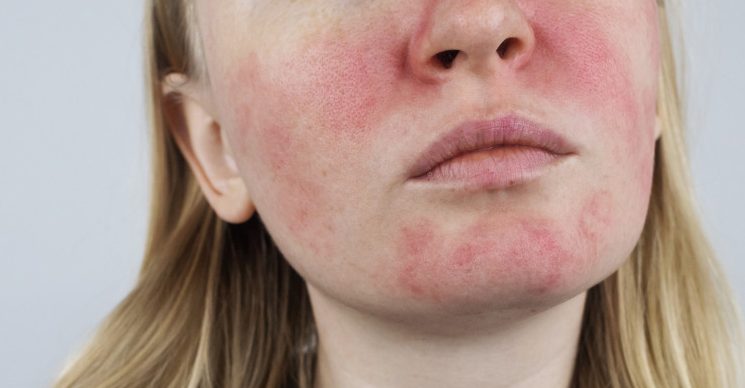ROSACEA
WHAT IS ROSACEA?
Rosacea is an inflammatory disorder of the face that causes a skin rash, couperose, telangiectasias, a burning sensation, pustules, and pimples on the cheekbones, nose, chin, and forehead. It affects up to 10% of the population and is three times more common in women.
As rosacea progresses, other conditions can develop, such as eye involvement, scaling, edema, and thickening of the skin, which is especially noticeable and characteristic when it affects the nose (rhinophyma).
It is a chronic condition whose first symptoms appear around the age of 20, and by the age of 30, they become more bothersome. It is a relatively prevalent health problem among those between 40 and 60 years of age.
WHAT SYMPTOMS DOES IT PRESENT?
Rosacea is a condition characterized by multiple symptoms, including transient or persistent erythema, inflamed papules or pustules, telangiectasias, and thickening of the skin on the forehead, chin, cheeks, and other areas. The transient erythema or flushing usually lasts less than five minutes and can spread to the neck and chest, often accompanied by a sensation of warmth. Other less common manifestations include erythematous plaques, scaling, or edema.
WHAT ARE THE CAUSES OF ROSACEA?
The exact cause of rosacea is unknown, but various factors can contribute to its development or worsen it, such as skin type, genetics, hormonal changes, diet, sudden temperature changes, sun exposure, wind, stress, or certain medications. Also, strenuous exercise, menopause, excessive alcohol consumption, or eating hot or spicy foods and beverages can contribute to the development of rosacea.
Other factors implicated in the development of rosacea include:
- Vascular abnormalities.
- Increased vasodilation mediators.
- Innate and adaptive immune responses.
- Presence of the demodex mite.
- Use of certain medications and topical irritants.
- Presence of SIBO (small intestinal bacterial overgrowth).

WHAT CAN I DO?
Rosacea is not a preventable condition, but symptoms can be alleviated or the severity of the condition reduced.
The main action is to identify triggers and avoid them: heat, alcohol, caffeine, exertion, spicy foods, etc.
We must also start treatment early, maintain good skin hydration, avoid products that irritate the skin (with exceptions), use broad-spectrum sunscreen, use makeup appropriate for our skin type, and use mild shampoos and gels to prevent further irritation.
WHAT CAN WE OFFER YOU AT ONE FACE?
Although there is no method that permanently cures rosacea, symptoms can be alleviated and their appearance minimized.
Depending on the symptoms, treatment will consist solely of topical treatments, with cosmetic or medical creams, topical or oral antibiotics, other oral medications, or intense pulsed light treatments.
In more severe cases, it is advisable to combine intense pulsed light therapy with the application of topical medications appropriate for each stage of rosacea.
Phymatous complications that appear in very advanced cases can be treated with laser or surgical excision.
MAKE AN APPOINTMENT ONLINE
If you are not sure which treatment you need, request a first appointment with our specialists without obligation and we will find the best solution for you.
Appointments can be requested exclusively online in the calendar on the right, follow these steps:
- Click BOOK APPOINTMENT and a link will open in DOCTORALIA
- Select the date and time you want.
- Enter your details into the system.
- You will receive an SMS confirming the date of your visit.
If once the appointment has been confirmed you need to modify it, cancel it or carry out any other procedure, please contact us to find the best solution.
CONTRATAR TRATAMIENTO
- Introduce los datos solicitados durante la compra
- Paga el tratamiento en un solo pago o en cómodos plazos
- Recibirás un email confirmando la compra

Una vez realizada la compra nos pondremos en contacto contigo para fijar fecha y hora para el tratamiento.
